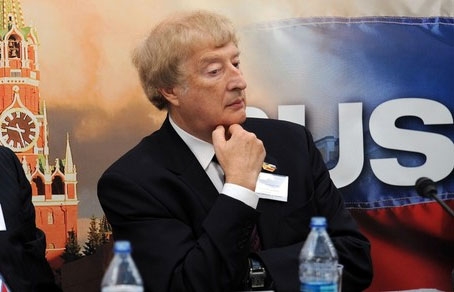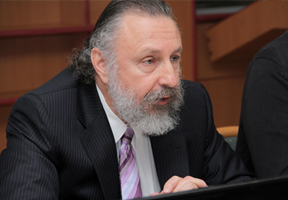
 U.S.-Russian cooperation is derailed by a puzzling chemical attack
U.S.-Russian cooperation is derailed by a puzzling chemical attack
U.S.-Russian cooperation is derailed by a puzzling chemical attack
Up until about a week ago, we saw the beginnings of the new "America First” approach to national security that Donald Trump had promised during the campaign and which had helped win him the presidency. In Syria, cooperation with Russia had begun to target the Islamic State, al Qaeda, and other embodiments of "radical Islamic terrorism,” which President Trump has sworn to destroy.
At home, things had also shifted. Democrats’ "Russiagate” claims that Moscow had tried to skew the 2016 election in Mr. Trump’s favor, based on zero evidence, were falling apart. Questions about who leaked classified information as part of a "soft coup” against Mr. Trump mounted with calls to put Susan Rice and Evelyn Farkas under oath and make them sing, take the Fifth or perjure themselves.
Everything changed on April 4 with media reports of a chemical weapons attack in an al Qaeda-controlled town in Syria’s Idlib governorate. None of the reports came from independent media or international experts’ examination of the site but were based entirely on cellphone footage and social media from sources hostile to the Syrian government.
The reports instantly received saturation coverage from mainstream media around the world. Western and allied governments, including regional powers aligned against Bashar Assad, immediately concluded that he and his Russian and Iranian backers were guilty. At an emergency meeting of the U.N. Security Council, calls by Russia and others for an investigation were contemptuously dismissed by western representatives.
On April 7, on orders from President Trump, American warships in the Mediterranean hit Syria’s Shayrat air base, identified by National Security Adviser H.R. McMaster with a "very high degree of confidence” as "precisely where the location originated,” with 59 Tomahawk cruise missiles. Syria reported 16 killed, including nine civilians. Moscow was reportedly warned about the strike and there were no Russian casualties.
On the domestic front, much of the media and political establishment that had been hostile to Mr. Trump suddenly were singing his praises. CNN’s Fareed Zakaria, previously a harsh critic who had derided Mr. Trump’s "rocking horse presidency” as a "circus,” intoned the next day: "I think Donald Trump became president of the United States last night.”
Trump supporters were split. Some welcomed it as a sign that "America is back” but some — including the writers of these lines — viewed the attack with distress and a sense of betrayal. Ann Coulter tweeted: "Trump campaigned on not getting involved in Mideast. Said it always helps our enemies & creates more refugees. Then he saw a picture on TV.”
"This whole thing stinks to high heaven,” said talk show host Michael Savage. "It looks like Hillary, Deep State won, and Trump is doing her bidding.”
Mr. Savage went on to raise a point probably on the minds of more critics of the action than are willing to admit it: Were Syrian government forces really responsible for the Idlib attack? Rep. Tulsi Gabbard, sponsor of the Stop Arming Terrorists Act to cut off tax dollars for giving weapons to ISIS, al Qaeda, and their allies, has been blasted from across the political spectrum for simply saying she was "skeptical” of the accepted version of events.
Mr. Assad had no reason to launch such an attack. Far from desperate, he is winning the war and was about to go into peace talks in a strong position. Washington had essentially disavowed regime change.
By contrast, the jihadists, with their military situation worsening, had every motive to launch a false flag. It is well known that ISIS, alQaeda and others have a chemical capability. There is reason to believe that jihadists, not government forces, were behind the 2013 Ghouta "red line” attack, using "kitchen sarin” supplied by Turkish intelligence.
Ascertaining the truth is critical in light of Trump administration officials’ threat to inflict much more extensive harm on Syria if there is another chemical attack. If the jihadists were indeed responsible for Idlib, the prospect of deadlier measures constitutes a standing invitation for them to do it again.
Meanwhile, Secretary of State Rex Tillerson has arrived in Moscow. Much may ride on what kind of message he bears and whether the Russians show him some serious proof that is not Mr. Assad who is responsible for this heinous crime.
If Mr. Tillerson comes prepared to dictate terms — Mr. Assad must go, Syria must be partitioned, Russia must acquiesce to any future U.S. military action against Iran — things will not go well.
But if, as some speculate, the attack on the Shayrat air base was designed as a measured response to show the world that Mr. Trump is not a man to be trifled with and to neutralize his domestic critics, which seems partially to have been accomplished, Mr. Tillerson perhaps can get much-needed U.S.-Russia cooperation against the terrorists back on track.
By Edward Lozansky and Jim Jatras
 Edward Lozansky is president of the American University in Moscow, Professor of Moscow Sate and National Research Nuclear Universities. He is the author of the book "Operation Elbe”, which describes joint US – Russia anti-terrorist efforts.
Edward Lozansky is president of the American University in Moscow, Professor of Moscow Sate and National Research Nuclear Universities. He is the author of the book "Operation Elbe”, which describes joint US – Russia anti-terrorist efforts.
 Jim Jatras is a former U.S. diplomat and foreign policy adviser to the Senate GOP leadership. He is the author of a major study, "How American Media Serves as a Transmission Belt for Wars of Choice”.
Jim Jatras is a former U.S. diplomat and foreign policy adviser to the Senate GOP leadership. He is the author of a major study, "How American Media Serves as a Transmission Belt for Wars of Choice”.



.jpg/250px-ElbeDay1945_(NARA_ww2-121).jpg)





